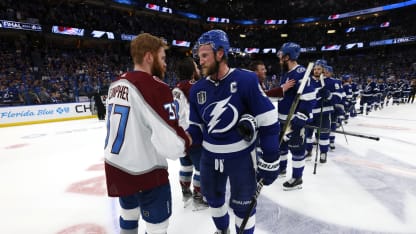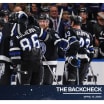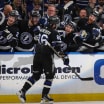Entering the Stanley Cup Final, one of the main storylines was the matchup between the prolific Colorado offense and the stingy Lightning team defense. In going 12-2 in the first three rounds, the Avalanche averaged 4.61 goals per game. The Lightning, beginning with their Game Seven first round win at Toronto, had effectively locked things down in nearly all of their subsequent contests. Excluding the 6-2 loss in Game One of the Eastern Conference Final, the Lightning had held the opposition to two goals or less in all but one of their other contests and allowed a total of 12 goals over 10 games.
Mishkin's Musings: Recapping a tough loss in the Final
Radio broadcaster Dave Mishkin on Tampa Bay's six-game defeat to the Avalanche

© Dave Sandford/Getty Images
The Lightning entered the Final by welcoming Brayden Point back to the lineup. Point had been injured in Game Seven against Toronto and hadn't played since. On the Colorado side for Game One, the Avs were without Nazem Kadri and Andrew Cogliano, both of whom had been hurt in the Western Final versus Edmonton.
The Avalanche are a team that moves at a fast pace. With the puck and without it. They skate fast, they play fast, they think fast. This allows them to transition quickly up the ice with the puck and attack the opposition d-zone with speed. It also helps them forecheck ferociously and force turnovers to keep the other side pinned back in the defensive zone.
Particularly at home, the Avs tend to start games with a burst of momentum. It's a challenge for their opponent to withstand that early surge and not fall behind.
In both of the first two games of the series, the Lightning weren't able to escape that first period Colorado push. During the opening 10 minutes of Game One, the Avalanche netted two goals. The first, off the rush, came after Mikko Rantanen's left circle shot squeezed past Andrei Vasilevskiy's left arm and rolled into the crease. Gabe Landeskog had crashed the net and was in position to swipe the puck across the goal line at 7:47. Less than two minutes, the Avs scored again. This time, the Lightning got stung by Colorado's forecheck. A couple of failed d-zone clears kept the puck in the Tampa Bay end. Nathan MacKinnon intercepted the puck at the blue line and fed Val Nichushkin, who wired a shot from the slot past Vasilevskiy.
The Lightning pushed back at 12:26, when Nick Paul collected a Victor Hedman flip/dump-in. Paul got behind the Colorado defense to grab the puck and he finished his in-alone chance. The Paul goal helped the Lightning settle down defensively. They played much cleaner hockey over the final 50 minutes of regulation than they had in the opening 10. But two overlapping penalties late in the first gave the Avalanche an extended five-on-three and they converted on an Artturi Lehkonen deflection at 17:31. The Lehkonen goal would be the last one the Lightning allowed through regulation.
And they tied things with a couple of goals midway through the second. Nikita Kucherov and Ondrej Palat teamed up on a two-on-two rush. They broke down the defense pair of Devon Toews and Cale Makar - Kucherov fed Palat for a tap-in at 12:51. Forty-eight seconds later, Mikhail Sergachev's snap shot from the right point beat Avs goalie Darcy Kuemper, tying the game at three.
Although they had rallied, the Lightning struggled to get pucks to the net in Game One. They posted only 23 SOG, while the Avs blocked 26 other attempts. The Lightning received an early third period power play. But with a chance to take the lead, they could not convert. Later, they had to kill another penalty themselves. It began late in the third after Pat Maroon put the puck over the glass in the defensive zone. But the Lightning delivered an important kill, one that carried over into the start of overtime. Less than a minute after the penalty ended, however, the Avs scored to win the game. In what would be a theme throughout the series, the Avs were the beneficiaries of fortunate puck luck. Hedman's outlet to center ice hit the skate of Steven Stamkos and caromed back to the Lightning's d-zone. Then came a Lightning neutral zone turnover. J.T. Compher countered and attempted a shot off the rush. It deflected off Hedman's skate and ricocheted directly to Nichushkin. He fed Andre Burakovsky on the other side of the ice, who finished a one-timer into the net.
Game Two featured another fast start for the Avs, who scored on an early power play. Unlike in Game One, the Lightning were unable to push back. The Avs played at a faster pace for entire contest and rolled to a lopsided 7-0 win. By thoroughly winning the possession battle, the Avs held the Lightning to just 16 shots on net.
Back home for Game Three, the Lightning picked up their own pace of play and leveled the ice. But they would play the rest of the series without Point, whose injury affected his ability to perform at his usual standard during the first two games. Still, the Lightning started the game well and generated a couple of early chances on Kuemper. But for the third straight games, the Avs would strike first. Although the Lightning successfully challenged a Nichushkin tally five and a half minutes in, they yielded a power play goal to Landeskog. The Avalanche captain was standing at the top of the crease when a Rantanen shot hit him and dropped into the crease. He knocked it in at 8:19. But the Lightning rebounded. Anthony Cirelli's goal off the rush tied things at 13:03. As Cirelli skated towards the crease, Kuemper appeared to misplay the puck and it slid through his pads. Just over a minute later, Palat got loose in the slot and finished his shot. The Lightning had their first lead in the series.
The Avs suffered more defensive breakdowns in the second period. Paul and Stamkos scored off open looks from the slot. Maroon cut to the front of the net from the left circle and roofed a backhander off Kuemper and into the top of the net. Landeskog tallied his second power play goal of the game as well, but the Lightning led, 5-2, after Maroon's goal. Kuemper was pulled for Pavel Francouz, who allowed a power play goal to Corey Perry at 14:58. Palat had tipped a Hedman shot off the post and Perry slammed in the rebound.
Down 6-2, the Avs pushed to start the third. They dominated possession and recorded several Grade-A chances. But Vasilevskiy turned them all aside and the Colorado attack became quieter in the final 10 minutes. The Lightning had pulled to within a game of tying the series.
Compared to Game Three, both sides tightened up defensively in Game Four. It's true that Cirelli opened the scoring thirty-six seconds into the game and the Lightning recorded a total of 17 first period shots on net. But Kuemper, responding from his Game Three outing, was sharp and the Lightning failed to add to their lead. Despite the high first period shot total, the Lightning didn't get as many open looks (after the Cirelli goal) as they had created in Game Three. At the other end, the Avs had several strong first period segments when they pinned the Lightning in the d-zone, but they managed just four shots on net. That's because 18 other Colorado attempts either missed the net or the Lightning blocked them.
Each of the last seven Avalanche goals scored in the series had some strange/controversial component to it. Fortunate component for Colorado. Unfortunate for the Lightning. The Avs tied the game at 5:17 of the second period. Vasilevskiy stopped Rantanen's power play shot, but the puck hit off MacKinnon's skate and bounced into the net. Hedman re-established a Lightning lead when he finished a backhander off the rush at 10:42, but the lead wouldn't hold. Early in the third, Nico Sturm's rebound shot hit Andrew Cogliano (who had returned to the lineup for Game Two) and, like MacKinnon's goal, bounced into the net.
The Lightning carried play over the second half of the third period, outshooting the Avs, 8-0. Kucherov hit the crossbar as well. But they couldn't break the tie. Then, in overtime, the tide turned. The Lightning had done hard (and successful) work to contain the Colorado attack throughout regulation, but in overtime, they seemed to run out of gas. They may have been affected by the fact that they played most of the game with only five defensemen. (Erik Cernak had blocked a shot early in the second period and did not return.) Also, in the overtime session, the Avs, who controlled possession, did well to keep Lightning players stuck on the ice. It was a long change for the Lightning, whose bench was across the red line from the defensive zone. Vasilevskiy made 10 overtime saves, several of which were high-quality, to extend things. The Avs also hit two posts. But finally, they won it. After a Lightning clear, the Avs transitioned quickly so that Ryan McDonagh and Sergachev, both of whom had endured a long shift, could not get to the bench. Kadri, who made his series debut in Game Four, cut past them and scored the winning goal.
Of course, after the fact replays showed that Kadri came on the ice early for MacKinnon and, in doing so, put himself in a position to attack the offensive zone and score. There should have been a too-many-men penalty called, because Kadri's early change significantly impacted the play. Instead, the goal stood and the Avs were a win away from the Cup.
By the time the puck was dropped for Game Five, the Lightning were already without Point. Others were playing through injuries. Kucherov and Paul had been banged up in Game Three (and we found out after the series that they both sustained MCL injuries). Late in the second period of Game Four, Cirelli, as we learned post-series, separated his shoulder. But facing elimination - and on the road in a raucous building - the Lightning delivered a gutsy, heroic performance. In a change from the first two games of the series, the Lightning managed the early minutes well and kept Colorado off the board. Jan Rutta's goal off the rush at 15:23 of the first gave the Lightning a 1-0 lead. As they did in Game Four, though, the Avs tied the score early in the second. Just before the Nichushkin goal, there was a controversial icing call. Paul appeared to outrace Makar to the face-off circle, but the official whistled icing. An instant later, Paul touched the puck first. In such an scenario, the officials often overrule the icing and put the face-off at center ice. Instead, they didn't reverse the call. The Avs won the ensuing face-off, Makar's shot hit off Ross Colton (creating a tough save for Vasilevskiy), and Nichushkin put in the rebound.
The Lightning regained the lead with a Kucherov four-on-three power play goal. The Lightning's power play had struggled in the series, having recorded just the Perry goal in Game Three. But with the extra open ice, the Lightning maintained o-zone possession and Stamkos set up Kucherov in the high slot for a one-timer past Kuemper's stick.
Another unlucky goal against for the Lightning came early in the third. Vasilevskiy stopped Makar's right circle shot, but the rebound hit Cernak's skate and went in the net. With the game tied and the crowd roaring, the Lightning pushed back and didn't allow the Avs to build momentum off Makar's goal. As the third period wound down, the Lightning held a possession edge. Outside of Sergachev's shot off the crossbar, though, they didn't create many Grade-A looks. Until Palat's game-winner. Sergachev and Hedman passed the puck back and forth in the offensive zone and the Avs lost coverage on Palat in the slot. Hedman fed him the puck and Palat one-timed it in at 13:38 for the eventual game-winner.
With a chance to tie the series and force a Game Seven, the Lightning came flying out of the gates in Game Six. O-zone forechecking pressure led to a Colorado turnover and a Stamkos goal at 3:48. But they couldn't maintain that pace after the first. The Avs tilted the ice over the final 40 minutes and it was in the second period that they netted the two goals they needed to take the lead. Both again featured controversy. On MacKinnon's tying goal, which came during a delayed penalty on the Lightning, Paul had momentary possession of the puck. This would have stopped play. Instead, the official allowed the goal to stand. On Lehkonen's winning goal, the Lightning felt a penalty should have been called on Josh Manson, who hooked Pierre-Edouard Bellemare in the Colorado end. The takedown of Bellemare led to a three-on-two rush for the Avs, who benefitted from another fortunate bounce. MacKinnon's attempted return pass to Manson hit off McDonagh's skate and caromed right to Lehkonen on the other side of the ice. He one-timed it in at 12:28.
The Lightning couldn't muster a significant pushback. They managed just six SOG after falling behind. Colorado dominated possession, which prevented the Lightning from going on the attack. Kuemper made tough third period saves on Kucherov, Alex Killorn, and Paul, but the Avs kept the pressure off for much of the final 30 minutes.
The Lightning battled in this series. Battled against a Colorado team that hit its stride in the playoffs and was playing fantastic hockey. Battled though injuries. Injuries that kept Point out of the line and affected others that stayed in the lineup. But, in the end, the Avs won the tug of war. Colorado's dominant offense, though held to just nine goals over the final four games of the series, was strong enough to have a major impact. The Lightning worked hard to defend, but that effort was a significant undertaking. It affected them in overtime of Game Four and the second half of Game Six.
Still, the Lightning showed heart. The final three games of the series could have swung in either direction. They had leads in all them. But the Avs earned what they got. Their impressive team speed was clicking at a Championship level. And they were deserving of the Championship they won.


















